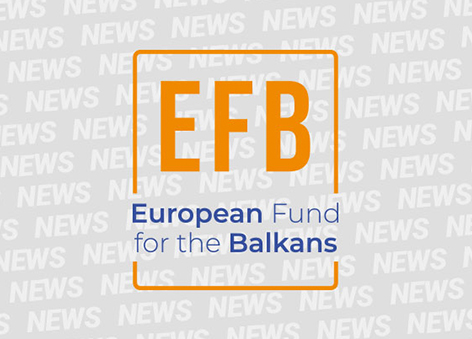
28.09.2015 All News
 What lies ahead for the Western Balkans in the Berlin Process? EFB Executive Director Hedvig Morvai will participate in a roundtable discussion on EU integration in the Western Balkan region on September 30, 2015, in Belgrade organised as part of the Belgrade Security Forum.
In the final declaration of the Vienna Western Balkans Summit in August, six Western Balkan countries that are not yet EU members – Albania, Bosnia, Kosovo, Macedonia, Montenegro and Serbia – agreed to refrain from “misusing outstanding issues in the EU accession process” and welcomed the EU pledge to support them in resolving bilateral disputes. Several concrete agreements were reached as the conference progressed: the conclusion of four important agreements in the EU-led talks between Serbia and Kosovo, and, the signature of a border agreement between Bosnia and Montenegro. In turn, Austrian and German leaders who were present announced support for key infrastructure projects and pledged solidarity during the on-going refugee crisis, which is affecting several Balkan states.
Nevertheless, many challenges remain. Balkan leaders and EU officials concluded that more efforts are needed to accelerate reform processes, notably in the areas of rule of law, economic governance and public administration, as well as in the fight against corruption, organised crime and terrorism. Lastly, as the final document reads, participants “became convinced that the threat posed by radicalisation, terrorism and violent extremism and in particular by foreign terrorists travelling via or from Western Balkan countries to Syria and Iraq, requires reinforced cooperation and an increase in the exchange of information”. The on-going refugee (or migrant) crisis represented one of the summit’s most hotly debated issues. The six countries promised to build their capacities in the areas of border management and the fight against trafficking and to strengthen their cooperation over asylum procedures, judged by many as unsatisfactory.
Also within the framework of the Vienna Western Balkans Summit, the Balkans in Europe Policy Advisory Group (BiEPAG), together with the EFB, presented policy recommendations for settling bilateral disputes among the countries of the region. BiEPAG experts offered a set of recommendations from their policy brief “Removing obstacles to EU accession: Bilateral disputes in the Western Balkans”, together with a “Declaration on bilateral issues”, proposed to governments of the Western Balkan states. These inputs were then fed into the summit meetings and conclusions.
Discussion topics of the roundtable:
What lies ahead for the Western Balkans in the Berlin Process? EFB Executive Director Hedvig Morvai will participate in a roundtable discussion on EU integration in the Western Balkan region on September 30, 2015, in Belgrade organised as part of the Belgrade Security Forum.
In the final declaration of the Vienna Western Balkans Summit in August, six Western Balkan countries that are not yet EU members – Albania, Bosnia, Kosovo, Macedonia, Montenegro and Serbia – agreed to refrain from “misusing outstanding issues in the EU accession process” and welcomed the EU pledge to support them in resolving bilateral disputes. Several concrete agreements were reached as the conference progressed: the conclusion of four important agreements in the EU-led talks between Serbia and Kosovo, and, the signature of a border agreement between Bosnia and Montenegro. In turn, Austrian and German leaders who were present announced support for key infrastructure projects and pledged solidarity during the on-going refugee crisis, which is affecting several Balkan states.
Nevertheless, many challenges remain. Balkan leaders and EU officials concluded that more efforts are needed to accelerate reform processes, notably in the areas of rule of law, economic governance and public administration, as well as in the fight against corruption, organised crime and terrorism. Lastly, as the final document reads, participants “became convinced that the threat posed by radicalisation, terrorism and violent extremism and in particular by foreign terrorists travelling via or from Western Balkan countries to Syria and Iraq, requires reinforced cooperation and an increase in the exchange of information”. The on-going refugee (or migrant) crisis represented one of the summit’s most hotly debated issues. The six countries promised to build their capacities in the areas of border management and the fight against trafficking and to strengthen their cooperation over asylum procedures, judged by many as unsatisfactory.
Also within the framework of the Vienna Western Balkans Summit, the Balkans in Europe Policy Advisory Group (BiEPAG), together with the EFB, presented policy recommendations for settling bilateral disputes among the countries of the region. BiEPAG experts offered a set of recommendations from their policy brief “Removing obstacles to EU accession: Bilateral disputes in the Western Balkans”, together with a “Declaration on bilateral issues”, proposed to governments of the Western Balkan states. These inputs were then fed into the summit meetings and conclusions.
Discussion topics of the roundtable:
- What is the state of bilateral relations in the Western Balkans?
- Can the EU enlargement process regain the momentum it had lost?
- What are the obstacles to the further democratisation of the region and which are the most worrying trends?
- What are the features of the strategic landscape in the Western Balkans, and who are the emerging players?
- Have 2014 and 2015 been wasted in terms of reconciliation initiatives?







